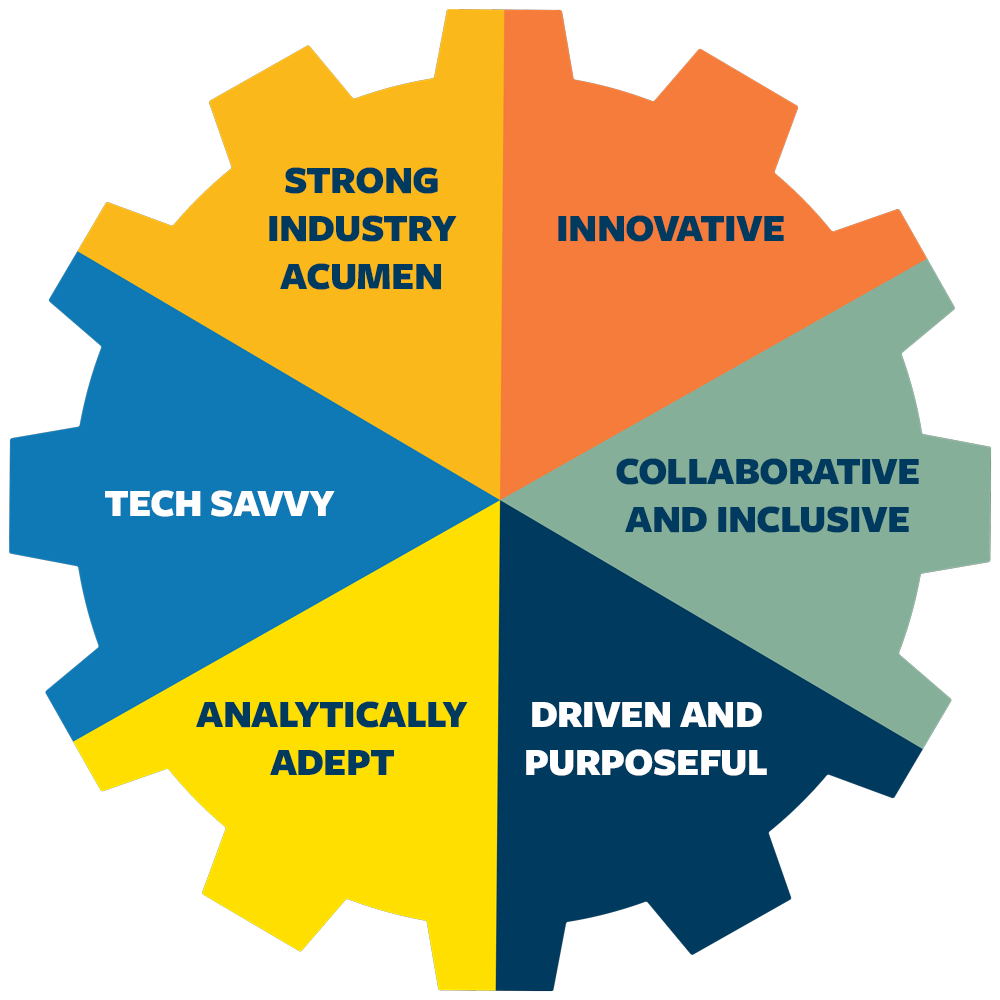
Management and Organizations

Therese Banks (’19)
Vice President and General Manager of US Small Merchant Client Management, American Express
| Year of Study | Summer | Fall | Winter | Spring |
|---|---|---|---|---|
| YEAR | July–August | September–December | January–March | April–June |
|
1st
|
Opening Residential Leadership Foundations: Foundations of Inclusive Leadership (Part I) |
Leadership Foundations: Foundations of Inclusive Leadership (Part II) - Data Analysis & Management Decisions - Economic Analysis for Managers |
Leadership Foundations: Foundations of Ethical Decision Making (Part I) - Marketing Management - Organizational Behavior - Electives Offered* |
Leadership Foundations: Foundations of Ethical Decision Making (Part II) - Financial Policy for Managers - Financial Accounting - Electives Offered* |
|
2nd
|
International Business Residential - Weekend Hybrid Elective - August Elective One Week Block |
Leadership Foundations: Transformative Leadership (Part I) - Operations & Technology Management - Competitive Strategy & Business Policy - Electives Offered* |
Leadership Foundations: Transformative Leadership (Part II) - Capstone Project: Strategic Management Research (SMR) OR Business Creation Program (BCP) - Global Economics and Business Cycles - Electives Offered* |
Leadership Foundations: Transformative Leadership (Part III) - Capstone Project: Strategic Management Research (SMR) OR Business Creation Program (BCP) - Electives Offered* |
1st YEAR |
FallSeptember – DecemberLeadership Foundations I - Data Analysis & Management Decisions - Economic Analysis for Managers |
WinterJanuary – MarchLeadership Foundation II (Launch) - Marketing Management - Organizational Behavior - Foundations of Ethical Decision Making (Part 1) - Electives Offered* |
SpringApril – JuneLeadership Foundations II (Conclusion) - Financial Policy for Managers - Financial Accounting - Foundations of Ethical Decision Making (Part 2) - Electives Offered* |
SummerJune – SeptemberInternational Business Residential - Hybrid Elective - August Elective Block Courses*td> |
2nd YEAR |
FallSeptember – DecemberLeadership Foundation III (Launch) - Operations & Technology Management - Competitive Strategy & Business Policy - Electives Offered* |
WinterJanuary – MarchLeadership Foundation III (Continues) - Capstone Project: Strategic Management Research (SMR) OR Business Creation Project (BCP) - Global Economics and Business Cycles (remote) - Electives Offered* |
SpringApril – JuneLeadership Foundation III (Conclusion) - Capstone Project: Strategic Management Research (SMR) OR Business Creation Project (BCP) - Electives Offered* |
*Electives typically take place once a month on Sundays of class weekends.
|
Leadership Foundations |
Designed to enhance student knowledge of, and competency in, leadership. Thus, the course has both conceptual and skill development objectives. The conceptual framework for the course is grounded in principles of individual, group, and organizational behavior. |
|
Data Analysis & Management Decisions |
Studies statistical model building with emphasis on managerial interpretation of statistical summary data. The course also covers classic statistics through multiple regression analysis to support subsequent courses in finance and marketing. |
|
Economic Analysis for Managers |
Focuses on analyzing the functioning of markets, the economic behavior of firms and other economic agents and their economic/managerial implications through a selected set of topics that are motivated by real-world observations of business operations. Topics to be covered include fundamental market forces, consumer and firm behavior under various market structures, sophisticated pricing strategies with market power, decision-makings under uncertainty/risk/information asymmetry, strategic interactions in game-theoretic situations and a variety of behavioral insights. |
|
Marketing Management |
To encourage strategic thinking about marketing, this module integrates theory and practice from the core disciplines of Marketing Strategy, Cross‐Cultural Consumer Behavior, Brand Management, Digital and Social Media Marketing and Analytics and Business Sustainability and Corporate Social Responsibility. |
|
Organizational Behavior |
Introduction to organizational behavior for executives, including but not limited to optimal decision making, fostering motivation, and other topics on psychology of leadership. Lecture, discussion and experiential applications of course concepts. |
|
Financial Accounting |
Familiarizes the manager with functions of accounting by focusing on the use of external financial reports for evaluating corporate performance and use of accounting information for internal planning and control. |
|
Foundations of Ethical Decision Making |
Provides practical tools to help students navigate difficult decisions that leaders routinely face. Study adopts behavioral science approach to understanding ethical behavior in order to examine why good people sometimes do bad things. |
| Leadership Foundations III | Further exploration of leadership strengths and weaknesses, with emphasis on individual leadership and organizational change. Readings, cases, decision simulations, peer coaching and discussions. |
| Operations & Technology Management | Analysis of strategic and operating policies and decisions for systems that produce goods and services. Examination of role of comprehensive planning, inventories, scheduling of resources, distribution systems and system location. Comprehensive operating problems. |
| Competitive Strategy & Business Policy | Study of general management task of forging a corporate competitive strategy. Emphasis on economics of business rivalry within a variety of industrial settings and implications of changing environments on business strategy. |
| Capstone Project Option: Strategic Management Research (SMR) | Preparation of strategic overview of selected company entailing collection and analysis of primary and secondary data, including (but not limited to) interviews of corporate executives, corporate financial and marketing data, industry reports and customer and competitor interviews and/or surveys. |
| Capstone Project Option: Business Creation Program (BCP) | Work alongside a team of classmates and a faculty advisor to transform an idea from a business plan to a functional startup organization. |
| Global Economics & Business Cycles | Comprehensive introduction to macroeconomics, with focus on real-world applications and implications. Provides students—as future decision-makers in business world—with framework through which to analyze domestic and global macroeconomic fluctuations and trends that impact business environment. |
| Leadership Communication (Elective) | The purpose of this course is to help improve your management communication skills, primarily in the areas of presenting and communicative persuasion. |
Strategic Management Research (SMR)
Work as a consulting team to address a business challenge or opportunity on behalf of a client organization.
Business Creation Program (BCP)
Work with a team to transform an idea from a business plan to a functional startup organization.
Business Plan Development
Customer Assessment & Analytics
Corporate Governance
General Management
Applying the Science of Happiness to Life Design
Negotiations
Tools and Analysis for Business Strategy
Choice Architecture
New Product Development
Entrepreneurship & Venture Initiation
Advanced Financial Policy For Managers
Venture Capital & Private Equity
Brand Management
Marketing Strategy
Financial Forecasting, Analysis & Modeling
Business Law
Technology Management
Leadership Communication
International Entrepreneurship









100%
MBA courses designed to build these key capabilities in you
1:1
Monthly leadership coaching, throughout your MBA experience
70+
Extracurricular opportunities including clubs, centers and conferences
Solves complex business problems in a transforming industry landscape


Catalyzes action by organizations, teams and individuals